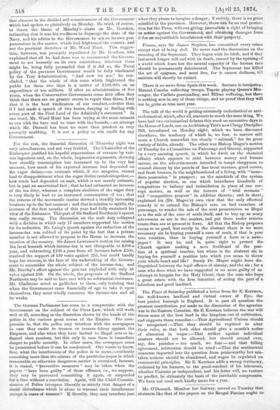The German Parliament has come to a compromise with the
Government on the subject of the Press Law, which will work well or ill, according to the discretion shown by the heads of the police in the various great towns of the Empire. The com- promise is, that the police may interfere with the newspapers in case they excite to treason or treason-felony against the Emperor, and also when they have incited to illegal acts or in- flamed class passions, but this only in case there is immediate danger to public security. In other cases, the newspaper must be prosecuted before it can be condemned. One wants to know, first, what the interference of the police is to mean,—evidently something more than the seizure of the particular paper in which treasonable or otherwise dangerous matter is contained, because, it is. Mated, " Preventive measures " may be taken when the papers " have been guilty " of these offences, i.e., we suppose, they may be prevented committing it again, or suspended for a time without a. conviction. Again, will the Chief ComMis- sioners of Police interpret liberally or strictly that danger of a social disturbance which is alone to warrant their interference except in cases of treason ? If literally, they may interfere just
when they please to imagine a danger ; if strictly, there is no great mischief in the provision. However, there can be no real protec- tion for the Press, without giving journalists a right of bringing an action against the Government, and obtaining damages from it for an unjustifiable interference with their property.


































 Previous page
Previous page